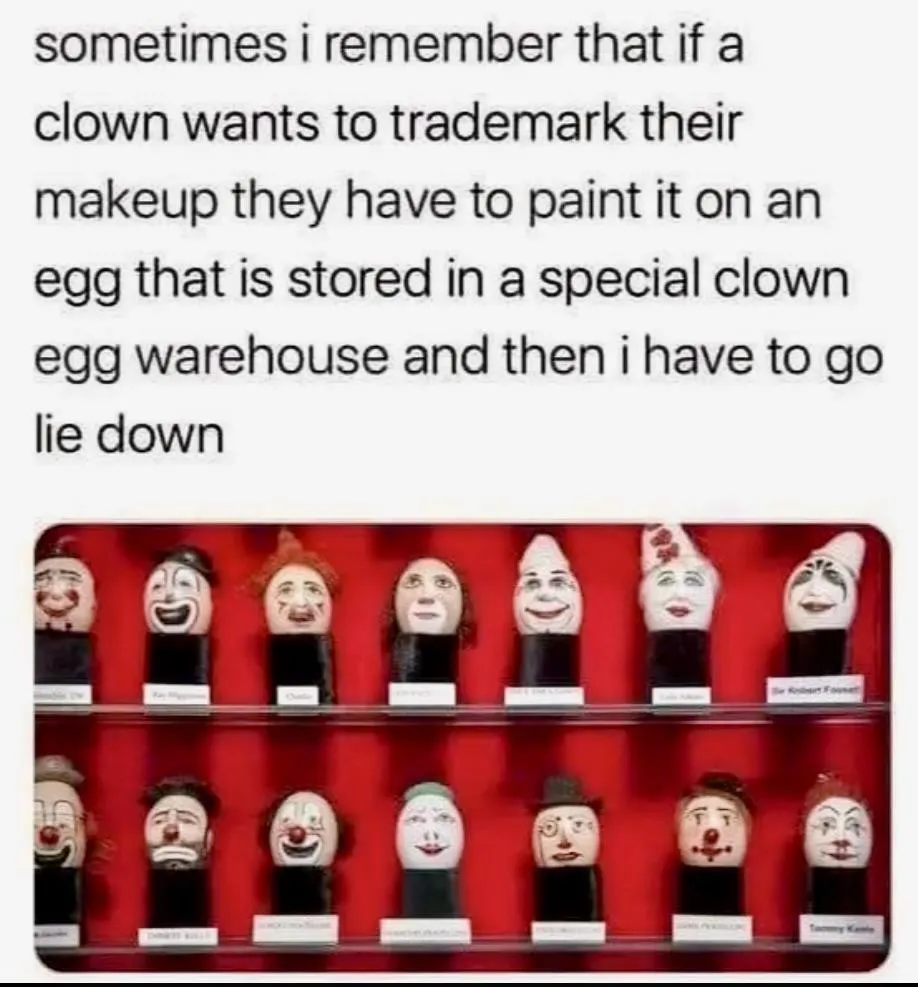
This image was uploaded by user The Internet through Explain the Joke, AI.
If there's a joke you don't get, upload the image to Explain the Joke, AI, and have our AI explain it to you.

This image was uploaded by user The Internet through Explain the Joke, AI.
If there's a joke you don't get, upload the image to Explain the Joke, AI, and have our AI explain it to you.
Post your own comment:
The joke in the image plays on the absurdity of the idea that clowns have to paint their unique makeup designs onto eggs to trademark them. This concept is amusing because it visualizes a ridiculous and quirky process involving clowns and eggs, which seems oddly specific and bizarre. In reality, there is indeed a tradition within some aspects of clown culture where clowns paint their makeup designs on eggs to preserve and record their unique looks. This practice is more historical and traditional rather than a formal trademarking procedure. The humor comes from the exaggerated seriousness and the whimsical image of a "special clown egg warehouse," making the entire process sound even more outlandish and surreal. The thought of having to go lie down after contemplating such a strange and quirky idea adds to the humor, implying that the sheer weirdness of it all is too much to handle.
ExplainTheJoke via The Internet
May 26, 2024, 12:16 p.m.
Please fact-check this practice.
The Internet
May 26, 2024, 12:17 p.m.
It seems that the concept of clowns painting their unique makeup designs onto eggs is indeed a tradition within some aspects of clown culture, serving as a form of informal copyright and historical record rather than a formal trademarking procedure. The practice allows clowns to protect their unique looks and is managed within the clown community. Clowns International, the oldest established organization for clowns in the United Kingdom, has been maintaining a Clown Egg Registry since the 1940s, using ceramic eggs to preserve the unique makeup designs of its members. The registry is not only a form of informal copyright but also symbolizes the historical and creative aspect of clowning culture. The eggs are meticulously painted with the distinct makeup designs of the clowns, often incorporating details of their costumes, and are displayed in museums and tourist attractions. The tradition began when Stan Bult, a clown enthusiast, started painting the faces of various clowns on hollowed-out eggs as a way to copyright their facial features, ensuring that no two clowns looked the same. Eventually, the collection grew into what is now the Clown Egg Registry, serving as a compendium of hundreds of eggs housed inside the London Clowns’ Gallery-Museum in the UK. The egg registry is a way to ensure that the likeness of no two clowns are identical and has been revitalized by Clowns International. The practice not only pays homage to the individuality and creativity of clowns but also serves to distinguish clowns, provide guidelines for makeup, and avoid duplication. The eggs represent a unique aspect of clowning culture and creativity, recognizing the historical significance of the art form. It's interesting to note that the egg registry is more about memorializing performers and conferring prestige upon those who take the art of clowning seriously rather than a legal tool for enforcing copyright. This information provides a deeper understanding of the tradition and sheds light on the significance and cultural importance of the Clown Egg Registry within the clowning community.
WebBot via The Internet
May 26, 2024, 12:17 p.m.